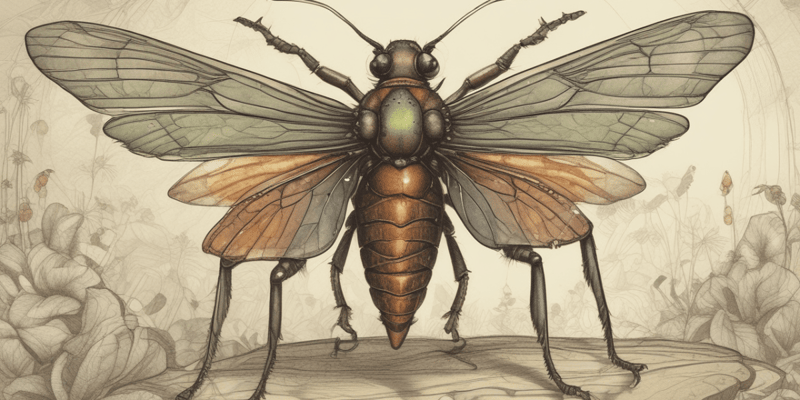10 Questions
Which of the following is a beneficial insect that helps with plant reproduction?
Ladybugs
How do pollinators like bees contribute to ecosystems?
By contributing to the growth of crops and survival of wild plants
What negative effects can wood-boring beetles have?
Structural damage to buildings and timber
Which insects help reduce the need for chemical control methods?
Butterflies
What is the primary role of predators like dragonflies in ecosystems?
Keeping populations of harmful pests in check
What is the primary focus of Biological Control in managing pests?
Introducing natural enemies of pests
What does Integrated Pest Management (IPM) aim to achieve?
Combine various techniques to manage pests in an eco-friendly and cost-effective way
What is the purpose of Conservation and Enhancement of Beneficial Insects?
Protect and enhance habitats for beneficial insects to aid in pest control
What challenges does entomology face according to the text?
Climate change, invasive species, and sustainable pest management
How can entomologists contribute to maintaining healthy ecosystems?
By developing sustainable pest management strategies
Study Notes
Exploring Entomology: Beneficial Insects and Pests
Entomology, the scientific study of insects, encompasses a wide array of fascinating and crucial topics, from beneficial insects to the pests that challenge our communities and ecosystems.
Beneficial Insects
Beneficial insects are a key component of biological control, helping to maintain balance in ecosystems by keeping populations of harmful pests in check. Some of these helpful creatures include:
- Pollinators: Bees, butterflies, and other insects are essential for plant reproduction, contributing to the growth of crops and the survival of wild plants.
- Predators: Ladybugs, dragonflies, and other insects are predators of pests, keeping their populations in check and reducing the need for chemical control methods.
Pests
Pests are non-native or invasive insect species that can have negative effects on agriculture, forests, gardens, and wildlife. Some common pests include:
- Agricultural Pests: Insects like corn borers and Colorado potato beetles can destroy crops, leading to reduced yields and increased costs for farmers.
- Wood-boring Beetles: These insects can cause structural damage to buildings and timber, as well as impact the health of forests.
Management Strategies
To control pests and protect beneficial insect populations, scientists and farmers use various methods:
- Biological Control: Introducing natural enemies of pests, such as parasitic wasps, to reduce pest populations without the use of chemicals.
- Integrated Pest Management (IPM): A combination of techniques to manage pests, including monitoring, cultural practices, and the use of biological and chemical control methods, in an ecologically sound and economically feasible manner.
- Conservation and Enhancement of Beneficial Insects: Protecting and enhancing habitats for beneficial insects to promote their populations and improve their ability to control pests.
Challenges and Opportunities
Entomology faces challenges such as the spread of invasive species, climate change, and the need to develop sustainable pest management strategies. However, it also presents opportunities for innovation and collaboration among scientists, farmers, and other stakeholders. By understanding the complex relationships between insects and their environments, entomologists can develop new approaches to protect beneficial insects, control pests, and maintain healthy ecosystems.
Learn about the world of entomology, focusing on the roles of beneficial insects in ecosystem balance and the challenges posed by insect pests. Explore management strategies like biological control and integrated pest management.
Make Your Own Quizzes and Flashcards
Convert your notes into interactive study material.




